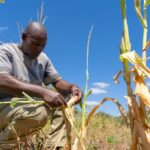
Timber cutting has evolved into a lucrative sector in Cameroon. Notably, the Dja Reserve and the Campo Ma’an National Park contribute significantly to this revenue stream. The timber extracted from these areas is exported via the port of Douala to neighboring countries.
As a consequence, the country has secured its position as one of the world’s top five exporters of logs. The nation relies heavily on the agriculture, forestry and fishing sectors, which represented nearly 17% of the GDP in 2022.
Timber Trafficking, A Sector of Informal Finance
For many communities, timber cutting represents a vital source of income and a means of survival in the face of limited economic opportunities. The revenue from selling wood can help families cover essential expenses such as food, healthcare and education.
Agricultural use and the cultivation of cash crops, coupled with residential heating, housing construction and charcoal production, further contribute to the demand for wood.
In the southern regions, a particular timber species known as matanda, a kind of mangrove, is subject to abusive cutting. Timber poaching continues to be a problem in spite of the fact that the Edéa National Park covers much of the matanda’s range. The problem is exacerbated by the demographic growth of Cameroon since independence. According to estimates from the United Nations Population Fund, Cameroon currently has a population of over 28 million people.
According to Marcel Beat, an environmental activist, more than 80% of the palm trees have been cut down in Youpwe, a town situated on the banks of the Wouri estuary. This has been primarily driven by the local community’s need for wood as fuel for cooking food, smoking fish and operating ovens.
In Eastern Cameroon, where wood resources are more abundant, there has been a notable increase in illegal wood trafficking. In 2018 and 2019, local established companies such as BU’MO and Foder have been implicated in unauthorized exploitation, collaborating with indigenous people.
In the far north of Cameroon, wood accounts for over 70% of the energy supply. In the Adamawa region, which is known for its grazing areas, herdsmen are compelled to clear the forest to enhance visibility for their livestock.
The State’s Role In The Fight Against Logging
The 1994 Forestry Law devolved forestry management to local authorities. This reform aimed to enhance management practices while promoting greater participation of the local population in the decision-making process.
One of the key objectives of the reform was to reduce poverty by improving the living conditions of rural populations, to be achieved through various projects aimed to address basic needs and provide essential services to villages. This included the provision of adequate drinking water and medicines, as well as the construction and maintenance of roads, schools and health facilities.
Unfortunately, local authorities do not seem to have been successful in stemming the outflow of poached timber.
Tropical rainforests are widely recognized by experts as the “lungs of the planet” due to their vital role in the process of photosynthesis. Through photosynthesis, these forests absorb and capture carbon dioxide from the atmosphere and release oxygen, which is essential for supporting life on Earth.
The depletion and destruction of these rainforests have significant consequences for the environment and human well-being. One of the immediate effects is the reduction in agricultural yields. Rainforests provide important inputs to the ecosystem, such as nutrient cycling, pollination and water regulation, which are essential for agricultural productivity. When rainforests are cleared or degraded, these processes are compromised, leading to decreased agricultural productivity and food security.
Efforts to combat deforestation, promote reforestation and restoration, and implement sustainable practices are essential in preserving these critical ecosystems and mitigating the far-reaching consequences of their depletion.
Source : Fair Observer





